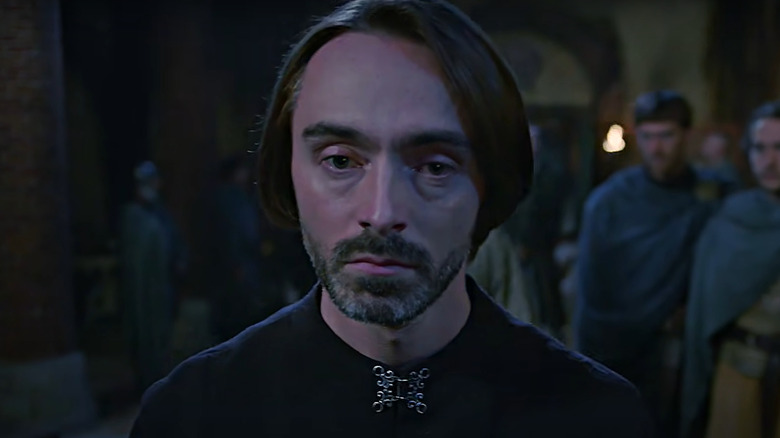The Last Kingdom's Worst Crime Against History
When Season 1 of the historical action-drama "The Last Kingdom" aired in 2015 on the BBC (it was only later acquired by Netflix), some might have suspected it of being algorithmically designed to cash in on the monumental success of HBO's "Game of Thrones" and the History Channel's "Vikings." But, without resorting to the dragons, sorcery, and lurid sexuality of the former or the rampant historical liberties of the latter, "The Last Kingdom" immediately earned the respect of critics and the love of fans.
Based on "The Saxon Stories" — Bernard Cornwell's series of historical novels — "The Last Kingdom" is set in ninth century Britain when England is split into multiple kingdoms and facing occupation and invasion from encroaching Danes. Across five seasons the show has followed the fortunes of Uhtred of Bebbanburg (Alexander Dreymon), the son of Saxon nobility who was taken as a young boy by raiding Danes and brought up as one of them. As a young man, Uhtred finds himself in the court of Alfred, King of Wessex (David Dawson) and plays a part in the political and military events that defined a tumultuous period in British history. Uhtred continually fights to have his birthright recognized by Alfred and treads the line between the Anglo Saxon and Danish universes, each with rival claims to his loyalty.
Any show centered on known historical events and figures such as King Alfred, Aethelred (Toby Regbo), and Aethelflaed, Lady of Mercia (Millie Brady) is bound to invite scrutiny from history enthusiasts, academics, and historians. And while "The Last Kingdom" bases its dramatic action on well-researched history, it is guilty of some heinous historical inaccuracies.
The Last Kingdom gets many historical details right
"The Last Kingdom" is a historical drama, and as such it tells its story by weaving together fictional characters with historical figures and events to create an engaging dramatic experience for its audience. The events of the show take place in early medieval Britain, and there isn't a great deal of detailed historical records of this era. We know of significant events such as the dates, location, and protagonists of major battles, but the specifics are missing. This gave the creators of "The Last Kingdom" leeway to interpret events and interject details for dramatic effect without violating the historical record.
Early medieval historian Professor Ryan Lavelle, the show's historical advisor, has said that it follows historical events, in his words, "reasonably closely, with a certain amount of license" (per Den of Geek). Lavelle notes that "The evidence for our period is limited so we always have to play with history to some extent."
Uhtred, for example, is based on a real historical figure but from the 11th century and not the 9th, as represented in the show. King Alfred the Great was indeed a devout Christian monarch who suffered from ill health and fought with some success to unite the disparate kingdoms of England into a single realm against the "heathen" Danish threat. Aethelflaed, according to the Anglo-Saxon Chronicle, was a powerful and inspirational female leader for the Mercians. But there are instances where "The Last Kingdom" took that certain amount of historical license too far.
The famous shield wall is probably wrong
Out of the gate, enthusiastic history fans were keen to challenge "The Last Kingdom" on many details, from the defensibility of Bebbanburg to the lack of realistic battle armor, the unkempt hair of Danes, the location of sword sheaths (no back sheaths allowed!), and Danish shield decorations. But the show has been recognized as taking far less license with history than "Vikings," and fans are happy to accept minor historical inaccuracies necessary to advance the drama.
Lavelle has acknowledged that there are diversions from the known historical record, some more forgivable than others (via Den of Geek). The timeline of events in the show is considerably condensed, in one instance compressing twenty years of history into eight episodes. This ensures an entertaining pace of dramatic events, and also to avoid constantly recasting the main characters with progressively older actors. Another glaring example is the continued presence of Alfed's wife Aelswith (Eliza Butterworth) in Season 4. She should have been long dead based on the historical chronology, but Lavelle points out that Aelswith serves a vital function in exploring the family drama in Alfred's court, and she's also a very entertaining character.
Probably the most shocking historical inaccuracy for some fans is the much-loved shield wall, which Lavelle says is most likely misrepresented in the show. The tightly overlapped and multi-layered battle formation often used by the Danes in "The Last Kingdom," is actually a Roman tactic. Lavelle points out that early medieval armies more than likely lacked the discipline and precision to effectively use such a technique. The shield wall is an interpretation of the Norse term "skjaldborg' meaning "shield fortress." It's a term that was probably used metaphorically by Norse poets, but has been picked up and developed literally by modern writers.


